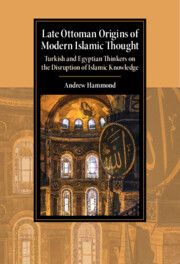 Late Ottoman Origins of Modern Islamic Thought
Late Ottoman Origins of Modern Islamic Thought Book contents
- Late Ottoman Origins of Modern Islamic Thought
- Cambridge Studies in Islamic Civilization
- Late Ottoman Origins of Modern Islamic Thought
- Copyright page
- Contents
- Figures
- Preface
- Note on Style
- 1 The Late Ottoman Intellectual Tradition
- 2 Ottoman Exiles
- 3 The Ottoman Scholars and Their Reception of Muḥammad ʿAbduh
- 4 The Salafi Revolution
- 5 Nation-State, Islamic State
- 6 The Late Ottomans’ Impact on Modern Islamic Thought
- Appendices
- Bibliography
- Index
- Other titles in the series
- References
Bibliography
Published online by Cambridge University Press: 03 November 2022
- Late Ottoman Origins of Modern Islamic Thought
- Cambridge Studies in Islamic Civilization
- Late Ottoman Origins of Modern Islamic Thought
- Copyright page
- Contents
- Figures
- Preface
- Note on Style
- 1 The Late Ottoman Intellectual Tradition
- 2 Ottoman Exiles
- 3 The Ottoman Scholars and Their Reception of Muḥammad ʿAbduh
- 4 The Salafi Revolution
- 5 Nation-State, Islamic State
- 6 The Late Ottomans’ Impact on Modern Islamic Thought
- Appendices
- Bibliography
- Index
- Other titles in the series
- References
- Type
- Chapter
- Information
- Late Ottoman Origins of Modern Islamic ThoughtTurkish and Egyptian Thinkers on the Disruption of Islamic Knowledge, pp. 280 - 313Publisher: Cambridge University PressPrint publication year: 2022
